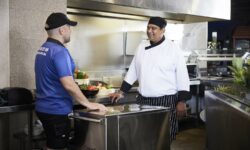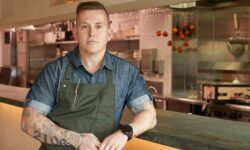Eun Hee An: Paper Giant
Eun Hee An, head chef of Sydney’s Paper Bird, tells of her biggest learning curves, most memorable food moments and what it takes to make it a commercial kitchen.
Eun Hee An never expected she would cook Korean food for a living. But the Le Cordon Bleu-trained chef and co-owner of Sydney’s Paper Bird is clearly doing a very fine job of it.
South Korean-born Eun moved to Australia when she was 20 in pursuit of her chef’s whites. Despite pleas from her parents to choose a less demanding vocation, she was soon collecting experience in top Sydney kitchens such as glass, Izakaya Fujiyama and the long-gone but much-missed Claude’s, under the tutelage of celebrated chef Chui Lee Luk.
While honing her skills at Claude’s – where Asian-influenced food met Western techniques – Eun never imagined her path would lead her to re-create the flavours of her South Korean childhood, spent in the seaside city of Ulsan.
That is until one night, with the closure of Claude’s looming, when Eun turned to Ben Sears, her partner in life and on the pass, and said, “I kind of want to do Korean food now.” So the pair, who had worked together for a year at Claude’s, set about opening their first restaurant.
Moon Park landed in Sydney’s Redfern in 2013 and became an instant hit. Critics, food bloggers and regular punters raved about the Korean-inspired eatery. Its fried chicken became legendary and the restaurant’s cool, offbeat K-pop vibe was the perfect fit for the zeitgeist.But starting Moon Park meant Eun had to make an important phone call: to her grandma, to ask for the family kimchi recipe. “OK I need to know how to make this stuff, so you have to teach me,” Eun recalls saying.
While Moon Park sadly closed after three years, the kimchi recipe is still going strong at Paper Bird, Eun and Ben’s two-year-old restaurant in Potts Point. “We always go back to Korea in winter when it’s kimchi season, and grandma will prepare 50 cabbages for us to help make the kimchi,” she says.
Moon Park may have succumbed to mundane issues such as rent affordability but its importance as a learning curve for Eun has endured. “Moon Park is where I learned to cook Korean food,” she says. “I’m Korean, I grew up eating lots of Korean food but that didn’t mean I knew how to cook Korean food.”
She has certainly mastered it now, along with many other Asian cuisines. Her time at Izakaya Fujiyama gave her a strong grounding in Japanese cooking, which remains a strong influence at Paper Bird. Eun says her cooking style is constantly evolving: she may have started cooking Asian food with a Western sensibility, but her heritage is becoming more pronounced and her interest in the home-style food of her culture is deepening.
Eun attributes the maturing of her culinary interests to a range of influences, from her grandmother to Chui Lee Luk, and a childhood travelling with her father sampling a range of diverse cuisines.
But it was a trip to Japan’s three-Michelin-starred Kagurazaka Ishikawa restaurant which she credits with providing her most illuminating food experience. It was there chef Ishikawa educated Eun in the nuances of rice. She was directed to smell and taste a range of different varieties of rice with the intent to glean their impact on a dish. “He was next-level,” she says. “It made me realise how rice can really impress people. When I got back, I tried every Korean-grown rice available in Australia until I found the right one.”
While some people think she’s crazy for using her chosen rice, on account of its cost, Eun says that running her own kitchen has only reinforced the importance of quality ingredients. For Eun, creating a menu is part of the creative process, a balancing act between the dishes she wants to showcase and the availability of ingredients.
Finding balance is perhaps one of Eun’s inherent talents. Not only is she adept at balancing the flavours in her incredible food, but also in negotiating the dynamics within a kitchen. Keeping everything running smoothly behind the pass can be a chef’s most arduous struggle, even without the complication of working alongside your significant other.
But after three kitchens, Eun and Ben seem to have found their synchronicity. “People think it’s amazing that Ben and I have worked five years in the kitchen together and we still like being together,” she says. “We try to respect each other. I think what helps is that we know each other’s strong points. Ben has more skills and basic knowledge, but I have more knowledge of Asian food.”
Softly spoken, delicate in frame and exceedingly humble, Eun is the antithesis of the stereotypical macho chef image. It’s impossible to imagine her firing off curt orders to staff or even becoming visibly frustrated. As such, her kitchen is a calm hive of activity. She’s learnt that raising her voice is no way to ensure the best food lands on the plate. “I used to get yelled at a lot, but it never helped me learn because I’d get freaked out. I don’t want my staff to be scared. If they’re not happy, they’re not going to put any love into what they’re doing.”
Despite her demure façade, Eun is no wallflower. As a young woman with English as a second language in a male-dominated industry, Eun had to dig deep to ensure she stood out among her peers. “I was the only woman [in the kitchen at Claude’s] and I was really young, I think I was 23 or something,” she recalls. “I tried not to be intimidated; I tried not to show my feelings because I didn’t want to look weak. I didn’t want to use the excuse of ‘I’m a woman’. I just tried a little harder. Even though I can’t carry 20 kilos of flour, somehow a super power comes out and you can do it.”
Her advice to young women entering the profession today? Be confident, resilient and strong. “If you go into a kitchen and think, ‘Oh, I’m a woman I’m afraid of men,’ that’s when you lose. First, you need to see yourself as equal. Once you think you’re a little bit weak, that’s when you get weaker.”
As a woman who has now helmed two successful restaurants, the question remains: what do her parents think of her career choice now? Although they’ve not yet made the trip to Australia, other family members have, returning with high praise for Eun’s talents. “After Moon Park and Paper Bird, they’ve finally said they’re very proud of me,” she says.
“I never thought I’d be making kimchi in my thirties, but I’m very proud of myself, too,” she says, smiling shyly. Take one bite of her cauliflower roasted in seaweed butter, and it’s evident she has every reason to be.
Since this interview was conducted, Eun and her partner Ben Sears announced that Paper Bird will close on August 3. “There’s a few reasons, but inconsistent trade is the biggest,” Ben told The Sydney Morning Herald. “It’s probably not a coincidence that there’s been half a dozen fairly high-profile closures in Sydney in the last month or two.” At this stage, the pair have not officially decided what comes next.
Image from Broadsheet. To keep up to date with food industry news and Fine Food Australia updates, subscribe here.
Most Read
You may also like
-
Stay up to date with the latest news, industry insights and Fine Food Australia updates.
- Subscribe









